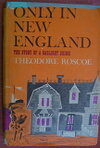
Theodore Roscoe (1906–1992)
Author of United States Destroyer Operations in World War II
About the Author
Works by Theodore Roscoe
The Lincoln assassination, April 14, 1865; investigation of a President's murder uncovers a web of conspiracy (1971) 6 copies
Toughest in the Legion: The Complete Adventures of Thibaut Corday and the Foreign Legion, Volume 2 (1988) 5 copies
Better Than Bullets: The Complete Adventures of Thibaut Corday and the Foreign Legion, Volume 1 (2012) 4 copies
Your Navy 3 copies
The Kid and the Cutthroats: The Complete Adventures of Thibaut Corday and the Foreign Legion, Volume 3 (2012) 3 copies
The Heads of Sergeant Baptiste: The Complete Adventures of Thibaut Corday and the Foreign Legion, Volume 4 (2012) 3 copies
To live and die in Dixie 2 copies
The Trent Affair, November, 1861: U.S. detainment of a British ship nearly brings war with England (A Focus book) (1972) 2 copies
Navy History and Tradition 1817-1865 (1959 comic) "The Daring and Diplomacy That Built A Great Navy" 1 copy
True tales of bold escapes 1 copy
I Was the Kid with the Drum 1 copy
Associated Works
Argosy, January 7, 1939 — Contributor — 1 copy
Tagged
Common Knowledge
- Birthdate
- 1906-02-20
- Date of death
- 1992-05-29
- Gender
- male
- Nationality
- USA
- Birthplace
- Rochester, New York, USA
- Place of death
- Florida, USA
- Education
- Columbia University
- Occupations
- novelist
short story writer
biographer
Members
Reviews
You May Also Like
Associated Authors
Statistics
- Works
- 34
- Also by
- 9
- Members
- 478
- Popularity
- #51,587
- Rating
- 3.9
- Reviews
- 6
- ISBNs
- 30













He covers the various uses of the submarine such as rescue of shot down airman, pre invasion surveys of island coasts, supplying arms and supplies to guerillas, rescuing people from Japanese held islands, surveying mine fields and much more.
While telling the overall history of the sub war in the Pacific, Roscoe fills the book with anecdotes from patrols using the captains' official reports as his source. He also documents every American submarine loss with details if known. He also includes charts to illustrate the loss of Japanese cargo shipping and Naval losses. His conclusion is that japan was starving because by July 1945 the country had few cargo ships left and and the few tankers that were still afloat could not be protected if they attempted to bring oil to Japan. There was little fuel left for aircraft or ships.
He makes a good argument that Japan would have had to surrender soon and in fact the Emperor and the civilian members of the government were in favour of surrender but the militarists in the government refused to give in. They could have prevented the suffering released by the Atomic bomb on their people.… (more)